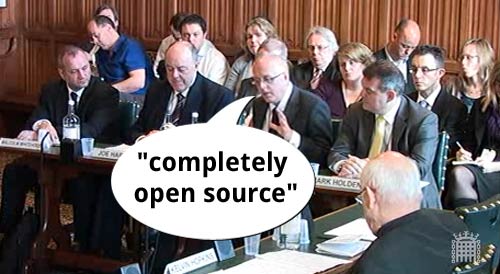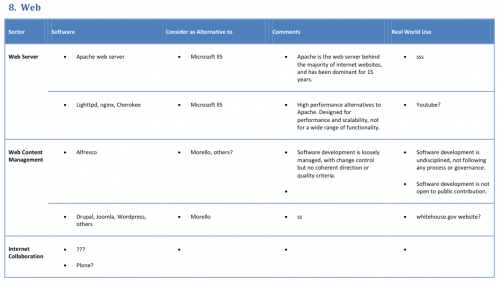One area where the LibDems were conspicuously – and perhaps surprisingly – lacking at the last election was technology policy. In fact, it hadn’t (formally) updated its thinking on the subject since 2003. But a working group was set up soon after the election, chaired by newly elected Cambridge MP Julian Huppert. A consultation paper was published a year ago; and as per the advertised schedule, a full-on policy paper (pdf) is being put to their annual conference next month. (Thanks to Richard Parsons for the tip-off.)
Under the rather curious title of ‘Preparing the Ground’, and bearing the somewhat ominous reference number 101, it sets out ideas ‘to put IT at the heart of government, to create a liberal and open environment for business, and to secure a better deal for citizens.’ And it’s well worth reading through its 20-odd pages: there’s some genuinely good stuff in there.
The first half concentrates on copyright and intellectual property issues: and as you might expect from a conference paper, there’s regular reference to the party’s liberal values. The paper restates a general preference in favour of free speech and self-policing, as well as a desire to ‘avoid well-intentioned but badly drafted rules’ around policing the internet – quite timely, amid talk from their Coalition partners of switching off social networks for a few hours, when we all need to calm down.
There are a few specific proposals, such as the suspension of IR35, repealing large chunks of the Digital Economy Act, and an in-context defence for Twitter Joke Trial scenarios. But it’s the underlying tone of the commentary which is most encouraging. Huppert and co clearly get this stuff.
The second half is much more natural territory for this here blog: ‘filling in the gaps’, particularly as regards the public sector’s use of technology. It starts with a rather bold statement:
It is essential that decision-makers and their advisers have a deep understanding of the impact of IT across society and a vision for what it can provide.
The proposal is that ‘a specific government office be established, encompassing the work of the current UK Government Chief Information Officer and staffed with experts in the IT field. This new government office would advise all other departments of ways in which IT can improve efficiency and quality of service to the public, and engender a culture of online engagement with the public.’ Civil service and local government managers, it suggests, should ‘undergo a serious period of initial training in the impact and current implications of IT, [to] be refreshed annually.’
Noting the high levels of mobile phone ownership among the lower social classes, there’s a specific recommendation that ‘the government make all appropriate public services available online and accessible by an average retail mobile phone. This may mean, in some cases, trimmed down versions of websites with richer content.’
And there’s endorsement – as you’d expect from the LibDems – for petitioning at all levels of the political process, ‘from parish council to European Parliament’. But whilst there’s a broad welcome for the new e-petitions framework, they want to go further:
We believe that the system should also encourage the formation of communities around both supporters and opponents of the proposition. Petitioning should be more than just a signature; it has the potential to foster more genuine involvement in the political process, making it easier for people to express their views effectively.
They go on to suggest:
The government should establish an e-Democracy centre to initiate and encourage the use of tools by individuals, communities and government at all levels, funded by central government on a permanent basis.
There’s also an explicit, indeed a ringing endorsement for government use of open source… and more.
It is our considered view that open source development is desirable and should be promoted… The government should ensure that it owns the code that it has paid for, and then share it for free within the public sector in order to avoid different parties paying external firms to develop the same software. We would like to see the public sector embrace collaborative development along the lines of websites such as Github.
One way of promoting open source would be for the government officially to support the use of those open source community websites which perform public services to a similar or better standard than official publicly-funded websites. The government could also consider providing resources to the creators responsible. Formerly it has been known for the government to attempt to replicate the work of such websites.
Nice… but I’d be against a separate ‘Github for government’, if that’s what it’s suggesting. Now that we’ve (more or less) won the argument for using open source for core government business, the next step in the evolutionary process is for government to systematically start sharing its insight, and the fruits of its labours, with everyone. (Or perhaps that’s what they meant by ‘support’ and ‘providing resources’ for third-party websites.)
There’s plenty more commentary over at Richard’s edemocracyblog. He summarises it as ‘a step forward for eDemocracy’, and I’m inclined to agree.
I’ve long been amazed that the LibDems haven’t been more vocal in this space – courting the geek vote, for want of a better description. It should be such natural territory for them. But there’s so much good sense in here, that it might be the start of something very interesting.



 Confirmation today of a promotion (of sorts) that’s been rumoured for the
Confirmation today of a promotion (of sorts) that’s been rumoured for the 